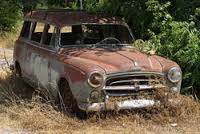From Clunkers to Couture
 The U.S. Environmental Protection Agency estimates that automotive recyclers can utilize up to 80% of the materials from a used vehicle, including steel, aluminum, plastics, batteries and tires. The remaining 20%, known as auto shredder residue, ends up in the landfill, with over five million tons contributed each year. Yet, a growing number of fashion designers are upcycling these once-undesirable car parts into wearable accessories.
The U.S. Environmental Protection Agency estimates that automotive recyclers can utilize up to 80% of the materials from a used vehicle, including steel, aluminum, plastics, batteries and tires. The remaining 20%, known as auto shredder residue, ends up in the landfill, with over five million tons contributed each year. Yet, a growing number of fashion designers are upcycling these once-undesirable car parts into wearable accessories.

LICENSE PLATE LOOKERS
In 1993, Ava DeMarco started making license plate and tuna can handbags in her basement. Now she’s the president of the thriving green accessories company Littlearth. Pittsburgh-based Littlearth sources 50,000 license plates per year and features them prominently in its best-selling Fender Handbags ($140; $250 with Swarovski crystals), made out of two plates and a recycled rubber strap.
“I wanted to make more permanent objects that people would use and keep,” says DeMarco. “We really pay attention to design and functionality—the products are fashion-oriented first and eco-friendly second.”
For a less conspicuous accessory, Littlearth’s nickel-free STATEment Bangle ($30) bracelets feature one-of-a-kind “graphic slices’ from U.S. license plates.
“We recycle America’s pop culture,” DeMarco says. “We take a lot of things that people identify with, especially with the automotive culture, and repurpose them.” http://shop.littlearth.com

TIRE TRANSFORMATIONS
For years, the sign of a good handbag was fine leather. Ethical consumers who wanted to avoid animal products and tanneries’ toxic chemicals were left with few options beyond drab vinyl or synthetic. But when English Retreads founder, designer and CEO Heather English floated down Colorado’s Boulder Creek in an inner tube, another option was born.
“It occurred to me that if this tube material could hold up in water, it could definitely work as a durable, yet fashionable handbag,” says English, a vegetarian.
English Retreads sources rubber tire inner tubes from within a 50-mile radius of Boulder, and estimates that each tube has sustained more than 60,000 miles. The leather-like quality of the rubber has made the Model T Tote Luxe ($149) the company’s top-selling bag, with five different lining colors and interior pockets for organizing. And she says the fact that their wallets were once wrapped inside truck tires holds appeal for guys, too.
Compassionate craftsmanship is also central to the company’s mission. “Our products are handcrafted in the U.S. by workers who earn a living wage,” says English, “and they [have] a lifetime guarantee.” English Retreads offsets their carbon emissions, too. www.englishretreads.com.

FAIR FASHION
Uca Ruffatti, a female-owned manufacturer in El Salvador, also utilizes discarded car and truck inner tubes in its Recybags line. The GreaterGood Network’s Hunger Site sells the handbags, providing fair wages for artisans. “We believe supporting fair trade businesses in impoverished countries is one of the best methods to reduce poverty, which in turn reduces disease and illiteracy rates,” says Rosemary Jones, public relations coordinator for the Network.
Jones noted that Uca Ruffatti bags have been a bestseller among the site’s many eco-friendly wares, including the Adela ($44.95), a handbag that features the unique patterns of the original tire tread. And, when purchased through the Hunger Site, the sale of each reclaimed product earns “cups of food” donation points for food relief and sustainable farming groups, including Mercy Corps, Feeding America and Millennium Promise. www.thehungersite.com.

BELTS OF BEAUTY
“Due to safety and quality standards in the automotive industry, millions of yards of seatbelts are discarded and left to sit in our overpopulated landfills,” says Harveys Marketing and Public Relations Coordinator Ashley Cope. “Harveys purchases the “discarded” webbing and creates beautiful Treecycle Seatbeltbags.”
Instead of using virgin material, Harveys, creator of the Original Seatbeltbag, uses 100% reclaimed materials in its Treecycle line. The popular Large Satchel ($148) prominently displays the seatbelt weaving patterns and color combinations that have made Harveys famous in the eco-fashion world. www.seatbeltbags.com.

